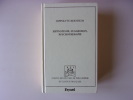Hippolyte Bernheim
Hypnotisme
Suggestion
Psychothérapie.
Ed: Fayard, 1995, 767 pp. In-8, état d'usage bon état, intérieur frais, couverture propre.
Reference : B28-31
ISBN : 2213595291
Hors frais d'expédition en France métropolitaine (tarifs compétitifs). Supplément tarifaire à prévoir pour expédition UE et hors-UE : NOUS CONTACTER. Expédition du livre à réception d'un paiement par chèque ou virement. Achat ou retrait possible en magasin.
Bookseller's contact details
Librairie Mille Feuilles
23 rue Pierre Semard
78190 Trappes
France
01 30 56 18 12
Payment mode
Sale conditions
Paiement par chèques, virement ou en espèces en magasin. Expédition à réception du paiement.
5 book(s) with the same title
Hypnotisme, suggestion, psychothérapie avec considérations nouvelles sur l'hystérie. Deuxième édition revue, corrigée et augmentée.
Paris, Doin, 1903; in-8 broché. "2 ff., II pp., 690 pp. C'est l'ouvrage capital du docteur Berheim, fondateur de l'école de Nancy. Applications scientifiques de l'hypnotisme et fondements de la psychothérapie. Ses expériences ont marqué Sigmund Freud qui a écrit: """" Je fus témoin des étonnantes expériences de Bernheim, et c'est là que je reçus les plus fortes impressions relatives à la possibilité de puissants processus psychiques demeurés cachés à la conscience des hommes"""" ( Ma vie et la psychanalyse)- Caillet 1045.- Cat. Haskell F. Norman I, 214 ( E.O.)."
HYPNOTISME, SUGGESTION, PSYCHOTHERAPIE.
Avec considérations nouvelles sur l'hystérie. Deuxième édition revue, corrigée et augmentée. Doin, Paris, 1903. In-8 (mm. 226x132), cartonato mod., conserv. cop. orig., pp. (4),II,690. Opera capitale del dottor Bernheim, fondatore della scuola di Nancy. Applicazioni scientifiche dell'ipnotismo e fondamenti della psicoterapia. Le sue esperienze sono segnate da Freud che scrive: "Je fus témoin des étonnantes expériences de Bernheim, et c'est là que je reçus les plus fortes impressions relatives à la possibilité de puissants processus psychiques demeurés cachés à la conscience des hommes" ( Ma vie et la psychanalyse) - Caillet 1045 - Cat. Haskell F. - Norman,I,214.Pagine leggermente ingiallite per la qualità della carta, peraltro in buono stato (good copy).
Hypnotisme, suggestion, psychothérapie
Bruxelles, Albert De Wit 1912 347pp.+ 5 planches, 22cm., reliure cart. (plats marbrés, dos en toile avec titre doré), 2 cachets, qqs. rousseurs, bon état, rare, Q79137
HYPNOTISME, SUGGESTION, PSYCHOTHERAPIE
FAYARD. 1995. In-12. Relié. Bon état, Couv. convenable, Dos satisfaisant, Intérieur frais. 767 pages.. . . . Classification Dewey : 180-Philosophie antique, médiévale, orientale
corpus des oeuvres de philosophie en langue française. Classification Dewey : 180-Philosophie antique, médiévale, orientale
Hypnotisme et suggestion. Hystérie - Psychonévroses - Neurasthénie - Psychothérapie -- BEL EXEMPLAIRE -- Troisième édition REVUE, CORRIGEE et AUGMENTEE
P., Doin, 1910, un volume in 8, broché couverture imprimée, 40pp., 755pp.
---- BEL EXEMPLAIRE ---- Troisième édition REVUE, CORRIGEE et AUGMENTEE : "Cette nouvelle édition contient mes idées actuelles sur le neurasthénie et les psychonévroses telles que leur étude prolongée par la suggestion les a imposées à mon esprit... Le mot hystérie, d'après sa signification traditionnelle s'applique à une psychonévrose spéciale caractérisée par les crises que tout le monde désigne de ce nom ; elle ne doit pas s'appliquer à toutes les psychonévroses, comme le propose Babinski... Je réserve le mot d'hystérie aux seules crises, dites hystériques, qui sont des réactions émotives psychodynamiques qui sont une variété de psychonévroses... Telle est la conception qui sera amplement développée dans ce livre". (Préface de Bernheim) ---- "Bernheim, a professor in the Faculté de médecine at Nancy, began studying hypnotism, suggestion and hysteria after observing Liébeault's method of treatment by induced sleep. After two years of working closely with Liébeault, Bernheim published the present work in which he stated that hypnosis was not a pathological state based on physiological processes, as Charcot claimed, but a purely psychological state closely connected with suggestion. Bernheim was the first to state that the stages of hypnosis posited by Charcot were actually artifacts produced by suggestion ; he also demonstrated that Charcot's "four-phase hysteria" was not an illness but a psychoneurotic reaction caused by suggestion, and curable by the same process. He believed that suggestibility was limited to hysterics but extended to the entire human race, and used the study of suggestibility to gain insight into human behavior. Historically this conception of Bernheim's should be considered the first known attempt to evolve a general understanding of human behavior and its motivation on the basis of the study of psychopathology rather than on the basis of philosophical systems". (Zilboorg p. 368) ---- CRABTREE N° 1284 (1891 ed.) : "In this work, Bernheim places an even greater emphasis on the importance of suggestion than he did in his earlier writings. After an historical review of the use of suggestion in healing among the Egyptians and the Hebrews, Bernheim notes that successful treatment by suggestion can be carried out in the waking state and need not involve hypnotism at all. He follows this with important observations on hallucinations and amnesia and discusses the problem of the moral responsibility of a subject in the hypnotic state. The final section, the largest of the book, presents observations on the treatment by suggestion of a variety of illnesses ranging from organically based conditions to hysteria" ---- NORMAN N° 214 1st ed. : "A companion volume to De la Suggestion et de ses applications à la thérapeutique..." ---- DSB II - Hunter & Macalpine p. 907 - Ellenberger - Postel & Quetel p. 583**477/F3
 Write to the booksellers
Write to the booksellers



